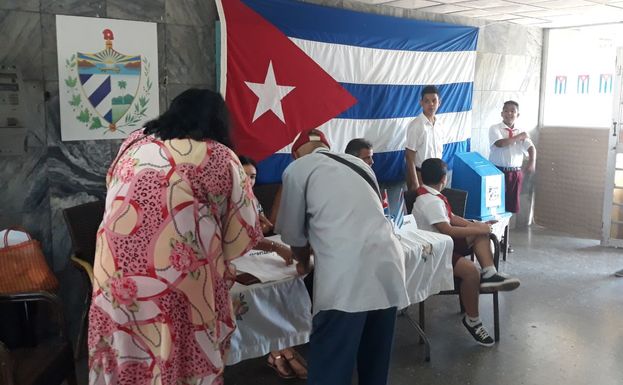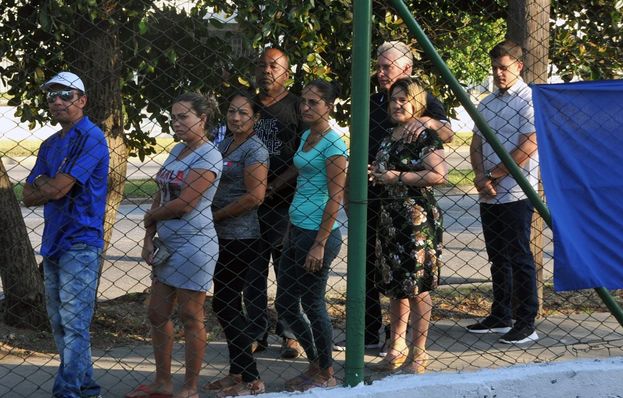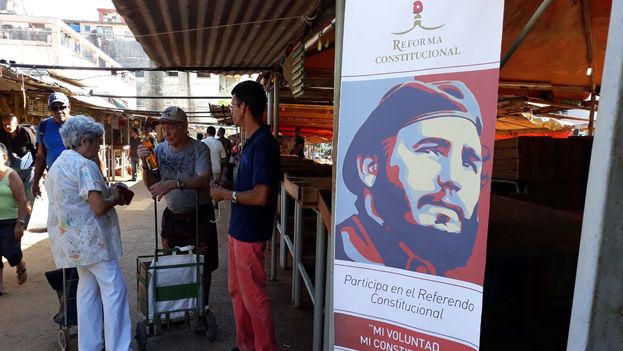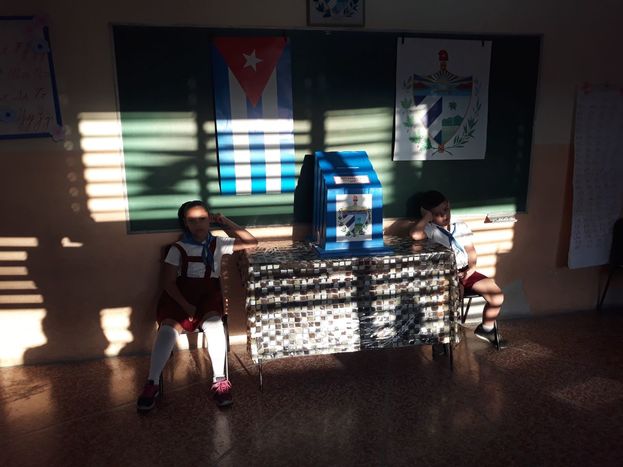
![]() 14ymedio, Havana, 24 February 2019 — An unusual bus procession travels around centrally located G Street in Havana starting in the morning this Sunday. Pedestrians passing through the street, also known as Avenue of the Presidents, cannot help associating the volume of buses with the electoral process that this Sunday convenes more than 8 million Cubans to the referendum on the Constitution.
14ymedio, Havana, 24 February 2019 — An unusual bus procession travels around centrally located G Street in Havana starting in the morning this Sunday. Pedestrians passing through the street, also known as Avenue of the Presidents, cannot help associating the volume of buses with the electoral process that this Sunday convenes more than 8 million Cubans to the referendum on the Constitution.
Like a calculated staging, the Cuban government has prepared every detail of a process that has a symbolic character than transcends the Constitution. “This is a referendum for the Homeland, for the Revolution, and for Cuba,” they have repeated until exhaustion in national media, in which they have presented No voters practically as enemies of the country.
Along with the intense propaganda, the Government has begun the sale of several products that have been missing for weeks. In several markets unexpected supplies of chicken and ham arrived hours before the voting started. Meanwhile, the astonished residents of some Havana municipalities saw vegetable oil land on the shelves of stores after a month’s absence.
“We are going to have to have a referendum every week to see if public transportation works and there’s food in the stores,” ironically remarks Claudia, a nurse in a maternal hospital in the capital. At the health center where she works “they had a meeting this week to warn that we would have to be prepared for any provocation that the counterrevolution might attempt,” on election day.

“They told us that we ourselves need to keep vigil so that everything goes well,” says Claudia, mother of a 9-year-old “young pioneer” who is today looking after a ballot box in one of the more than 25,000 polling places set up all over the country. “They’re going to give her a canned drink and a bite to eat,” the woman tells 14ymedio. “With that I no longer have to make lunch,” she adds.
Long lines aren’t seen at the polling places, but they are in the markets. At the kiosks managed by the Youth Labor Army, on 17th street, buyers arrived early to get pork. On the other hand, few people are seen at the nearby voting center.
Several activists, among them the dissident Julio Aleaga, reported cuts to their cellphone service. Internet connection from cellphones is also suffering frequent interruptions this Sunday. The Government also cut access to independent news sites, among them 14ymedio, Cibercuba, Diario de Cuba, and Tremenda Nota. As for the ruler Miguel Díaz-Canel, official media showed him, in short sleeves, in a little line along with his wife to vote at polling place number 3, Tecnosuma, located at 140 street, between 25 and 31.

“We Cubans are voting for our Constitution, we are voting for Latin America and the Caribbean, we are also voting for Venezuela, we are defending Venezuela, because in Venezuela the dignity of the continent is at stake,” said Díaz-Canel in statements to the press after casting his vote.
The ruler took advantage of the opportunity to harshly criticize Latin American leaders who accompanied humanitarian aid to Venezuela, along with interim president Juan Guaidó. “They looked like clowns, a group of presidents at the Colombian border. Who are those presidents supporting? When all those presidents have more problems than Venezuela has,” he said.
On social media several people denounced the presence of propaganda for Yes inside voting centers and some also complained of lack of privacy to vote. “I had intended to mark No but I got scared that they would see me because in the cubicle there was no curtain or door, so I ended up marking Yes,” said a voter in Sagua La Grande, in the center of the Island.

In Camagüey the religious worship at the church led by the evangelical pastor Bernardo de Quesada was interrupted by a police officer and a Public Health representative because “they are making a lot of noise” on an election day where everything should be “calm and based on the vote,” they were told, which the pastor’s wife condemned to this newspaper.
The noise of an electric polisher fills a stretch of Ayestarán street, in Havana. Osvaldo, 42, is repairing an old car a few meters away from the polling place where several residents form a short line to vote. “I’m not going to go because that’s not going to change anything,” the mechanic says categorically while pausing in his work.

Osvaldo was born the same year in which the current Constitution was submitted to a vote and this would be his first opportunity to participate in a referendum, but he has several reasons to not attend. “I don’t believe that a text is going to improve the situation that we are living in Cuba; that is going to remain as letters on paper but reality will continue in its own direction.” Not even the recognition of private property, included in the Constitution, seems to motivate him.
“It’s not exactly private property because when the Government wants to confiscate something from you, they do it and that’s it,” he believes. “That little shop on the corner was my grandparents’ and they took it away after the Revolution triumphed. Now that private property is recognized, are they going to give me back what belonged to my family or not?” he asks as he starts up the polisher again.

From Last Tunas, in the east of the island, a pastor from the Evangelical League of Cuba reported that they had just called him from the Central Committee of the Communist Party to invite his faithful to vote Yes.
“I left it very clear to them that our fight is not political, that it is in favor of our biblical principles and that they cannot count on our vote in favor if that Constitution does not represent us,” denounced the religious figure, who prefers to remain anonymous. Authorities have locked up and threatened in the last few days several pastors to pressure them to change their position on the new Constitution. Evangelical, Christian, and Catholic churches have been especially critical of the text, calling on their faithful to vote with their conscience.
“You have besieged and intimidated us only for defending our rights and our principles. You can’t count on us,” the pastor answered the official, who abruptly terminated the call.
Translated by: Sheilagh Carey
_______________________________________
The 14ymedio team is committed to serious journalism that reflects the reality of deep Cuba. Thank you for joining us on this long road. We invite you to continue supporting us, but this time by becoming a member of 14ymedio. Together we can continue to transform journalism in Cuba.
